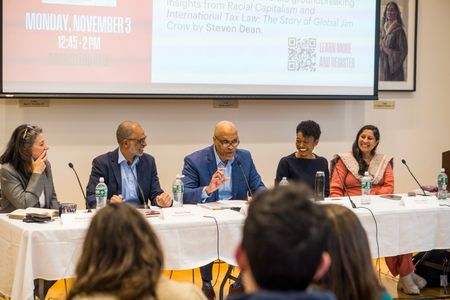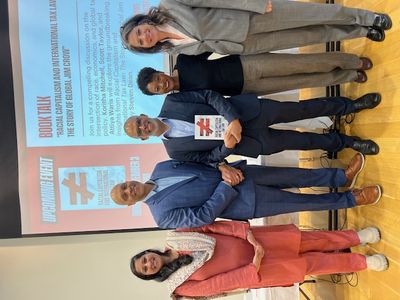Dean Taylor Participates in Panel Discussion on Global African Economics and Steven Dean’s New Book

On November 3, 2025 at the Boston University School of Law, Scott Taylor, Dean of the Pardee School of Global Studies and Professor of International Relations at Boston University, partook in a panel discussion on the new book, Racial Capitalism and International Tax Law: The Story of Global Jim Crow, written by and discussed with Steven Dean, Paul Siskind Research Scholar at Boston University’s School of Law. The two were also in conversation with Attiya Waris, UN Independent Expert on foreign debt and human rights and professor of law at the University of Nairobi, and Koritha Mitchell, Professor of English and African American Literature at Boston University’s School of Arts and Sciences. The conversation was led by Jessica Silbey, Honorable Frank R. Kenison Distinguished Scholar in Law at Boston University’s School of Law.
In Steven Dean’s telling, Global tax policy has long determined which states can access the resources necessary to flourish. Today, even the wealthiest states struggle to tax rich individuals and multinationals. Dean argues that anti-Black racism has enriched affluent states at the expense of marginalized ones and undermined the taxing power of all nations.

In a compelling narrative interwoven with personal storytelling, Racial Capitalism and International Tax Law: The Story of Global Jim Crow connects Dr. Martin Luther King Jr.’s metaphor of the “bad check”—representing unfulfilled promises of freedom and equality to Black Americans-to contemporary anti-Black global tax policies. The book uncovers lost connections, such as those between Edwin Seligman, an architect of our global tax system, and the Dunning School, which laid the foundation for Jim Crow laws, and between Stanley Surrey, a Harvard professor and advisor to President John F. Kennedy, and key moments of the Cold War. Furthermore, it takes a global view and reveals how racial panic triggered by African decolonization allowed an exclusive club of white countries to deliver a second “bad check” to newly sovereign states like Kenya and Nigeria. By circumventing the inclusive one-country, one-vote system of the United Nations, the OECD and its double tax treaty dismantled the generous arrangements that helped Europe rebuild after both World Wars.
In his response, Dean Taylor connected Professor Dean’s argument to the larger context of African global history. As a scholar of African politics and political economy, Dean Taylor contextualized the legal constraints on Africa’s involvement in the private sector and the global view of African economics as “dire.” He noted that the current situation stems considerably from the legacy of African countries’ export dependence on colonial powers and constrained domestic private business, especially at the time of independence in the 1960’s. African countries’ nationalization of considerable portions of their economies was in part a result of their inability to tax multinational corporations, and the rejection of many postcolonial Africa leaders’ appeals to the United States for support, led many to turn away from the US for a generation. Drawing on Professor Dean’s analysis of racialized international tax regime, Dean Taylor’s comments asked the audience to consider how the African development story might have been different, had the US upheld its own values in both taxation and diplomacy when dealing with the newly-independent African states.